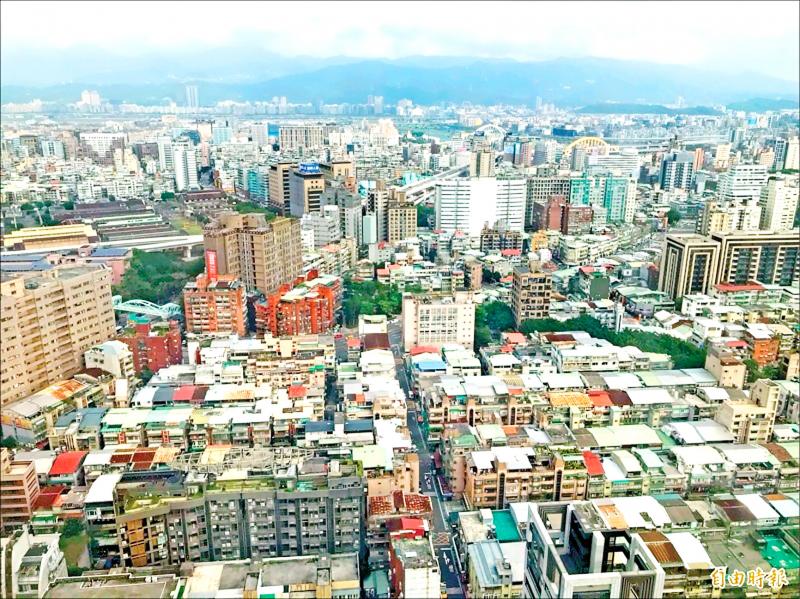The urban land price index for Taipei grew at slightly faster than elsewhere in Taiwan during the second and third quarters of last year, data released by the Ministry of the Interior on Friday showed.
The urban land price index — the weighted average land price of urban areas, which is measured every six months — rose 1.54 percent for Taipei in the April-to-September period compared with the previous six months, the data showed.
The increase reflected a relatively low comparison base in the previous six months, when initial fears over the COVID-19 pandemic hurt the city’s property market, and a stabilization of property prices later in the year, the ministry said in a statement.

Photo: Hsu Yi-ping, Taipei Times
Taipei’s Nangang District (南港) saw the biggest gains of the city’s 12 districts, with its land prices rising 1.86 percent because of improving public transportation and a growing population fueled by development in the district, the ministry said.
The urban land price index for Taiwan as a whole rose 1.04 percent in the April-to-September period compared with the previous six months, and increased 1.21 percent from a year earlier.
The urban land price index is based on the median land price for residential and commercial property and industrial zones in a city or county to show land price fluctuations. The ministry releases the index data twice a year, in January and in July.
As for the five other special municipalities, the index rose 1.3 percent in New Taipei City, 1.09 percent in Tainan, 0.77 percent in Taoyuan, 0.76 percent in Taichung and 0.5 percent in Kaohsiung, the ministry’s data showed.
New Taipei City benefited from efforts to develop the MRT rail system, and Tainan was boosted by large investments in Southern Taiwan Science Park (南部科學園區).
The index for outlying Lienchiang County fell 0.09 percent from the previous period — the only one of Taiwan’s 16 other cities and counties to show a decline in prices.

UNCERTAINTY: Innolux activated a stringent supply chain management mechanism, as it did during the COVID-19 pandemic, to ensure optimal inventory levels for customers Flat-panel display makers AUO Corp (友達) and Innolux Corp (群創) yesterday said that about 12 to 20 percent of their display business is at risk of potential US tariffs and that they would relocate production or shipment destinations to mitigate the levies’ effects. US tariffs would have a direct impact of US$200 million on AUO’s revenue, company chairman Paul Peng (彭雙浪) told reporters on the sidelines of the Touch Taiwan trade show in Taipei yesterday. That would make up about 12 percent of the company’s overall revenue. To cope with the tariff uncertainty, AUO plans to allocate its production to manufacturing facilities in

TAKING STOCK: A Taiwanese cookware firm in Vietnam urged customers to assess inventory or place orders early so shipments can reach the US while tariffs are paused Taiwanese businesses in Vietnam are exploring alternatives after the White House imposed a 46 percent import duty on Vietnamese goods, following US President Donald Trump’s announcement of “reciprocal” tariffs on the US’ trading partners. Lo Shih-liang (羅世良), chairman of Brico Industry Co (裕茂工業), a Taiwanese company that manufactures cast iron cookware and stove components in Vietnam, said that more than 40 percent of his business was tied to the US market, describing the constant US policy shifts as an emotional roller coaster. “I work during the day and stay up all night watching the news. I’ve been following US news until 3am

Taiwan will prioritize the development of silicon photonics by taking advantage of its strength in the semiconductor industry to build another shield to protect the local economy, National Development Council (NDC) Minister Paul Liu (劉鏡清) said yesterday. Speaking at a meeting of the legislature’s Economics Committee, Liu said Taiwan already has the artificial intelligence (AI) industry as a shield, after the semiconductor industry, to safeguard the country, and is looking at new unique fields to build more economic shields. While Taiwan will further strengthen its existing shields, over the longer term, the country is determined to focus on such potential segments as

COLLABORATION: Given Taiwan’s key position in global supply chains, the US firm is discussing strategies with local partners and clients to deal with global uncertainties Advanced Micro Devices Inc (AMD) yesterday said it is meeting with local ecosystem partners, including Taiwan Semiconductor Manufacturing Co (TSMC, 台積電), to discuss strategies, including long-term manufacturing, to navigate uncertainties such as US tariffs, as Taiwan occupies an important position in global supply chains. AMD chief executive officer Lisa Su (蘇姿丰) told reporters that Taiwan is an important part of the chip designer’s ecosystem and she is discussing with partners and customers in Taiwan to forge strong collaborations on different areas during this critical period. AMD has just become the first artificial-intelligence (AI) server chip customer of TSMC to utilize its advanced